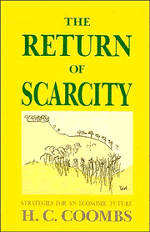Book contents
- Frontmatter
- Contents
- Introduction
- 1 Towards a Sustainable Society
- 2 Scarcity, Wealth and Income
- 3 Matching Ecological and Economic Realities
- 4 Science and Technology - For What Purpose?
- 5 Economic and Ecological Issues in Resource Management
- 6 Resource Management and Environmental Law
- 7 The Quality of life and Its Assessment
- 8 Is Democracy Alive and Well?
- 9 Technology, Economic Change and Political Strategy
- Bibliography
8 - Is Democracy Alive and Well?
Published online by Cambridge University Press: 05 August 2012
- Frontmatter
- Contents
- Introduction
- 1 Towards a Sustainable Society
- 2 Scarcity, Wealth and Income
- 3 Matching Ecological and Economic Realities
- 4 Science and Technology - For What Purpose?
- 5 Economic and Ecological Issues in Resource Management
- 6 Resource Management and Environmental Law
- 7 The Quality of life and Its Assessment
- 8 Is Democracy Alive and Well?
- 9 Technology, Economic Change and Political Strategy
- Bibliography
Summary
Paper presented at the University of Western Australia on their 51st Annual Summer School, January 1979, the 150th anniversary of the establishment of white settlement in Western Australia. Subsequently printed as a Working Paper (10) by the Centre for Resource and Environmental Studies, Australian National University, Canberra, ACT, 1979.
DEMOCRACY IN AUSTRALIA
Australia has been called the Lucky Country. While so many peoples of the world today are deprived and oppressed, we enjoy a relative opulence and freedom worthy of their envy. But to what extent are we aware of our privileged condition and do we strive to practise and protect the democratic rights so enjoyed now and for the future?
There is no doubt that Australians have been given opportunities almost unique to determine their own form of government and to mould it to their heart's desire, and that they are inclined to think of their system as one embodying the essential principles of democracy. It is much less certain that we have used those opportunities wisely and generously, and there are grave doubts about whether our democracy is more than a matter of legal forms and empty processes.
Abraham Lincoln spoke of democracy as government ‘of the people, by the people and for the people’. Few would doubt that what we have is government ‘of the people’. We have legislative bodies at federal, state and local levels making laws and regulations to control our behaviour and to administer our common affairs.
- Type
- Chapter
- Information
- The Return of ScarcityStrategies for an Economic Future, pp. 128 - 142Publisher: Cambridge University PressPrint publication year: 1990



